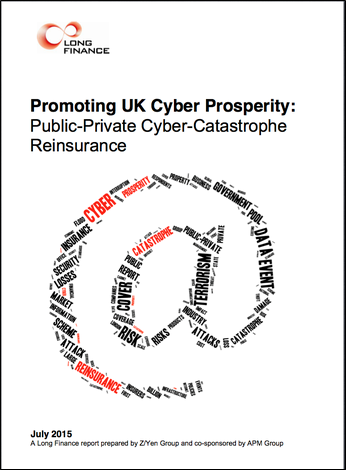Authors
Professor Michael Mainelli, Chiara von Gunten, and Mark Duff
Sponsored by
- APM Group
Published by
Z/Yen Group, Long Finance (July 2015), 50 pages.
Share on social media:


Promoting UK Cyber Prosperity: Public-Private Cyber-Catastrophe Reinsurance
This Long Finance research project sought to explore how cyber-catastrophe reinsurance might help mitigate cyber-risk, establish some evidence of the appetite for such reinsurance, and examine how government might best provide support for the establishment of an efficient, largely free-market solution.
Started in May 2015, the resulting report entitled "Promoting UK Cyber Prosperity: Public-Private Cyber-Catastrophe Reinsurance" was released in July 2015 (press release).
Co-sponsored by APM Group, the report explores the nature of cyber-risk and the role of cyber insurance and reinsurance as a risk mitigation tool with a focus on cyber-catastrophe events that is cyber events that could seriously affect the economy. The report explores how a public-private cyber-catastrophe reinsurance scheme could help secure ICT-based prosperity in the UK by helping insurers insure themselves to insure others. The scheme would provide cover to a group of insurers above a catastrophic loss threshold, in effect a pool funded by the insurance industry. The UK government’s role would be one of promotion and (possibly) a last resort insurer only in the event that industry retentions and the scheme’s reserves have been exhausted. In all likelihood, the UK government would be a last resort insurer anyway during a cyber-catastrophe, but would benefit by having already promoted risk reduction and mitigation, as well as having accrued some financial reserves.
Long Finance engaged key stakeholders including insurance experts and professionals (existing cyber underwriters and specialist brokers), reinsurance professionals, other financial services firms (e.g. major exchanges or fintech firms), providers of cyber-protection services, law and accountancy firms and government through over 80 semi-structured interviews, a round-table, and a webinar.
Related Publication
Related events
- Michael Mainelli's presentation "Promoting UK Cyber-Prosperity Through Economics", Gresham College, London, Monday 18 January 2016
- Long Finance webinar "Is There a Role for a Public-Private Cyber-Terrorism Reinsurance? Preliminary Findings", Wednesday 24 June 2015 (08:30 to 10:00 BST)
- Report launch "Promoting UK Cyber-Prosperity: Public-Private Cyber-Catastrophe Reinsurance", London, Tuesday 28 July 2015 (09:30 to 11:00)
In The Media
- "The UK Needs to Better Insure Itself Against the Cyber-Terrorism Threat", City A.M., 3 December 2015
- "Pool Re Boss Raises Prospect of Separate Cyber Reinsurance Scheme", The Post, 31 July 2015
- "Report Urges Public-Private Cyber-Catastrophe Reinsurance Scheme", Business Insurance, 31 July 2015
- "Public, Private Cyber Catastrophe Reinsurance Scheme Would Add Clarity to U.K.'s Cyber Insurance Market, Encourage Take-Up: Report", Canadian Underwriter.ca, 31 July 2015
- Michael Mainelli interviewed on Morning Money, Share Radio, 31 July 2015
- Lisa Howard, "Public-Private Catastrophe Scheme in UK Would Help Mitigate Cyber-9/11: Study", Insurance Journal, 31 July 2015
- "Public-Private Cyber Reinsurance Scheme Called for by Think Tank", Out-Law.com, 30 July 2015
- "Cyber catastrophe reinsurance plan would improve UK resilience", Business Insurance, 29 July 2015
- "UK Cyber Insurance Report Recommends Reinsurance Scheme", ComputerWeekly, 28 July 2015
- "Cyber Catastrophe Bonds & a Public-Private Sector Solution", Artemis, 28 July 2015
- Philip Virgo, "Is Big Data Leakage the New Asbestosis: Uninsurable? If so ...", ComputerWeekly, 23 July 2015




